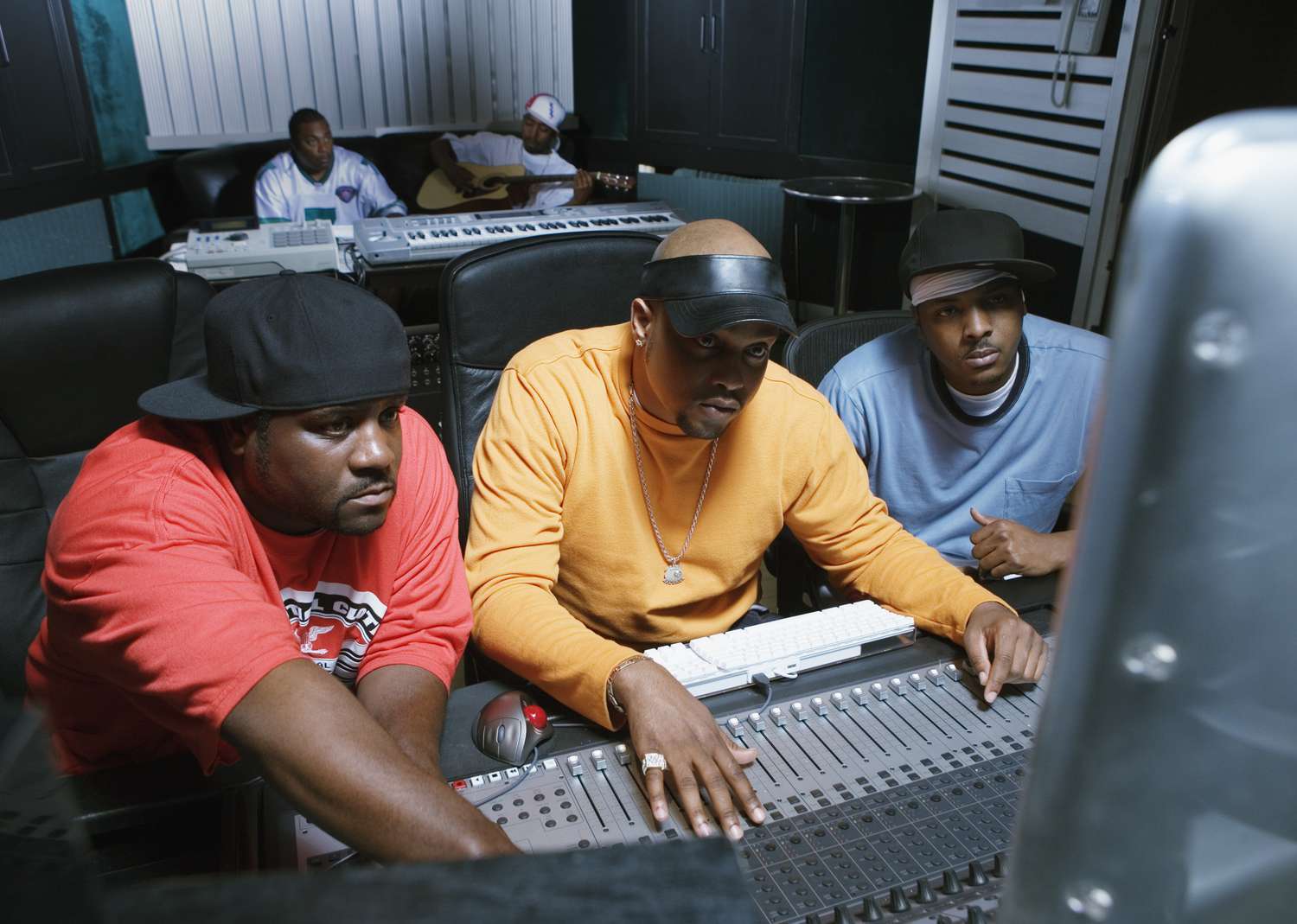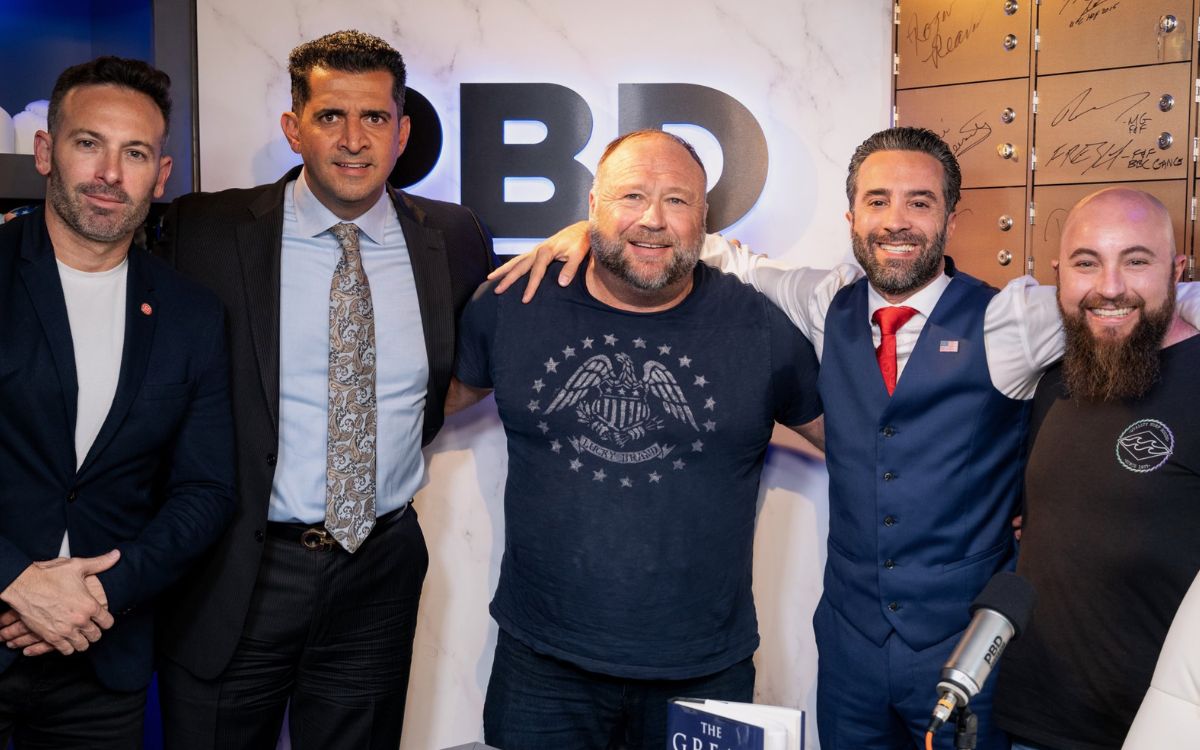Home>Events & Info>Podcast>What Is Podcast Producer


Podcast
What Is Podcast Producer
Modified: January 22, 2024
Discover what a podcast producer does and how they can help bring your podcast to life. Learn the key responsibilities and skills required for podcast production.
(Many of the links in this article redirect to a specific reviewed product. Your purchase of these products through affiliate links helps to generate commission for AudioLover.com, at no extra cost. Learn more)
Table of Contents
Introduction
Welcome to the world of podcasts, where audio content takes center stage in the digital realm. Over the past decade, podcasts have exploded in popularity, captivating millions of listeners around the globe. In this fast-paced industry, podcast producers play a vital role in bringing high-quality audio content to life.
A podcast producer is a creative mastermind who oversees the entire production process of a podcast. They ensure that every episode meets the highest standards of sound quality, content relevance, and audience engagement. From conceptualizing the show’s format to coordinating with hosts and guests, podcast producers are the driving force behind the success of a podcast.
In this article, we will delve deeper into the world of podcast production and explore the responsibilities and skills required to become an effective podcast producer. Whether you are an aspiring producer looking to enter the industry or simply curious about the behind-the-scenes workings of a podcast, this article will provide you with valuable insights.
Throughout the article, we will touch on the technical skills required for podcast production, the process of content creation and editing, managing the podcast production process, team coordination and communication, as well as distribution and marketing strategies. By the end, you will have a comprehensive understanding of what it takes to be a successful podcast producer.
So, let’s embark on this journey into the world of podcast production and discover the magic that happens behind the scenes of your favorite shows.
Definition of a Podcast Producer
A podcast producer is the mastermind behind the creation and execution of a podcast. They are responsible for overseeing every aspect of the podcast production process, ensuring that each episode meets the desired standards of quality and content. The role of a podcast producer can vary depending on the size and structure of the production team, but their main objective is to bring the vision of the podcast to life.
A podcast producer wears many hats. They are involved in brainstorming ideas for episodes, researching and booking guests, coordinating recording sessions, managing audio editing and post-production, and overseeing the distribution and marketing of the podcast. They work closely with hosts, co-hosts, guests, and other team members to create a cohesive and engaging listening experience for the audience.
At its core, the role of a podcast producer is to ensure that the podcast operates smoothly and efficiently. They are responsible for maintaining a consistent brand image and tone throughout the episodes, and they often act as the main point of contact for the podcast, liaising with sponsors, advertisers, and other external partners.
Essentially, a podcast producer serves as the backbone of the podcast, bringing together all the moving parts to create a polished and professional final product. They possess a unique blend of creative, technical, and organizational skills that enable them to navigate the complexities of podcast production.
Successful podcast producers have a deep understanding of their target audience and the podcasting industry as a whole. They are skilled storytellers who know how to craft compelling narratives and engage listeners. They are also adept problem solvers, able to tackle unexpected challenges that may arise during the production process.
Overall, the role of a podcast producer is multifaceted and demanding, requiring a combination of creative flair, technical expertise, and excellent organizational skills. They are the driving force behind a podcast’s success, ensuring that every episode delivers a memorable listening experience for the audience.
Responsibilities of a Podcast Producer
The responsibilities of a podcast producer cover a wide range of tasks and duties, all aimed at creating and maintaining a successful podcast. Let’s explore some of the key responsibilities that a podcast producer typically undertakes:
- Conceptualizing and Planning: Before a podcast can come to life, a producer must work closely with the hosts and stakeholders to develop the show’s concept, format, and overall direction. They contribute ideas for episode topics, segments, and interview guests, ensuring that the content aligns with the podcast’s goals and target audience.
- Organizing and Scheduling: A podcast producer is responsible for managing the production schedule and coordinating with hosts, guests, and the production team to ensure everyone is on the same page. They schedule recording sessions, arrange interviews, and maintain a well-structured timeline to meet episode release dates.
- Recording and Sound Quality: The podcast producer oversees the recording process to ensure high-quality audio production. They select suitable recording equipment, set up recording sessions, and monitor sound levels to ensure clarity and consistency. They also handle any necessary edits or improvements to enhance the overall audio experience.
- Content Editing and Post-Production: Once the recordings are complete, the podcast producer takes charge of reviewing, editing, and polishing the content. They carefully edit the episodes to remove any errors, optimize pacing, and enhance the overall flow. They may also add sound effects, intro/outro music, or special segments to enhance the listener experience.
- Show Promotion and Marketing: A crucial responsibility of a podcast producer is to promote and market the show. They develop a marketing strategy to increase the podcast’s visibility through social media, email newsletters, collaborations, and other promotional channels. They also identify potential sponsorships or partnerships to support the podcast’s growth.
- Managing Budget and Resources: Podcast producers often play a role in budget management, ensuring that expenses align with the allocated resources. They may oversee equipment purchases, studio rentals, or outsourcing services, all while staying within the defined budget constraints.
- Analyzing Performance and Feedback: Podcast producers monitor audience analytics and feedback to gauge the show’s performance. They analyze listener data, ratings, and reviews to identify trends, areas for improvement, and potential content opportunities. This valuable insight helps them make informed decisions about future episodes and overall podcast strategy.
These are just a few key responsibilities of a podcast producer. Depending on the scope of the podcast and the size of the production team, additional tasks may include scriptwriting, guest outreach, coordinating live events, managing sponsorships, and more. The role of a podcast producer is dynamic and ever-evolving, requiring adaptability, creativity, and impeccable organization skills to ensure the podcast’s success.
Technical Skills Required for a Podcast Producer
A successful podcast producer possesses a variety of technical skills that are essential for effectively managing the production process. Let’s explore some of the key technical skills required for a podcast producer:
- Audio Recording and Editing: A podcast producer must have a solid understanding of audio recording techniques and equipment. They should be proficient in using recording software and hardware, such as microphones, mixers, and audio interfaces. Additionally, they should be skilled in audio editing software, allowing them to remove background noise, enhance sound quality, and ensure a polished final product.
- Sound Mixing and Mastering: The ability to mix and master audio is crucial for a podcast producer. They must be skilled in adjusting audio levels, eliminating audio inconsistencies, and creating a balanced and immersive audio experience. This includes tasks such as equalizing, compressing, and adding effects to ensure a professional-sounding final mix.
- Scriptwriting and Storytelling: While not purely technical, the skill of scriptwriting is essential for a podcast producer. They need to be able to craft engaging scripts that captivate the audience and deliver information effectively. A podcast producer should have a keen eye for storytelling, creating compelling narratives that keep listeners hooked.
- Content Management Systems: Podcasts often require a robust content management system (CMS) to organize and publish episodes. A podcast producer should be familiar with different CMS platforms, enabling them to efficiently upload, schedule, and distribute episodes to various podcast directories.
- RSS Feed Management: Understanding how to manage and troubleshoot RSS feeds is vital for a podcast producer. They should be familiar with the technical aspects of creating and updating RSS feeds, ensuring that new episodes are delivered to podcast platforms and subscribers without any issues.
- Basic Web Design and HTML: While not essential, a basic understanding of web design and HTML can be beneficial for podcast producers. It allows them to make small adjustments to podcast websites, customize player embed codes, and troubleshoot any issues relating to the podcast’s online presence.
- File Compression and Formatting: Podcast producers should know how to compress and format audio files correctly. This skill ensures that episodes are optimized for different platforms and have manageable file sizes without compromising on sound quality.
- Knowledge of Podcast Directories and Platforms: Podcast producers should be well-versed in various podcast directories and platforms, such as Apple Podcasts, Spotify, Google Podcasts, and more. This knowledge helps them optimize podcast metadata, ensure accurate distribution, and take advantage of platform-specific features for greater exposure.
These are just a few of the technical skills that podcast producers should possess. It’s important to remember that the podcasting landscape is continually evolving, and staying up to date with emerging technologies and trends will only enhance a podcast producer’s capabilities.
Content Creation and Editing
Content creation and editing are integral parts of a podcast producer’s role. A podcast producer must have a keen eye for storytelling, ensuring that each episode delivers compelling and engaging content that resonates with the target audience. Let’s explore the process of content creation and editing in more detail:
Brainstorming and Research: Before diving into creating podcast episodes, a producer must collaborate with hosts and stakeholders to brainstorm ideas and plan the overall structure of the show. This involves researching topics, identifying potential guests, and determining the format and tone of the episodes. A producer must have a solid understanding of the target audience and their interests, allowing them to curate relevant and engaging content.
Outline and Scriptwriting: Once the general direction is established, a podcast producer often creates episode outlines or scripts to guide the hosts during the recording process. These outlines provide a framework for the episode, including key points, interview questions, segment transitions, and any scripted content. The producer ensures that the scripting aligns with the overall theme and objectives of the podcast.
Recording Sessions: During recording sessions, the podcast producer plays a crucial role in guiding the hosts and ensuring that the content flows smoothly. They may provide feedback, suggest improvements, and help hosts stay on track with the outlined structure. The producer also watches out for any technical issues or audio inconsistencies that may arise during the recording process.
Editing and Polishing: After recording, the podcast producer takes the raw audio and meticulously edits it to create a polished final product. This process involves removing any errors or unwanted segments, optimizing pacing, and enhancing overall audio quality. The producer may also add intro/outro music, sound effects, or transitions to create a cohesive and engaging listening experience.
Content Curation and Guest Management: In addition to creating original content, podcast producers often manage guest appearances and interviews. They research and book guests who can provide valuable insights or perspectives, ensuring that the content remains interesting and diverse. Managing interviews involves coordinating schedules, preparing guests, and conducting pre-interview research to facilitate engaging conversations.
Consistency and Branding: A podcast producer is responsible for maintaining consistency across episodes and ensuring that the podcast aligns with its brand identity. This involves maintaining a consistent tone, style, and format throughout the series. Producers may establish style guides or brand guidelines to ensure that all episodes maintain a cohesive feel and resonate with the target audience.
Quality Control and Feedback: The final responsibility of a podcast producer in the content creation and editing process is quality control. They listen and review episodes before release, checking for any audio issues, content coherence, and overall quality. Producers also rely on audience feedback and analytics to continually improve and refine the content strategy based on listener preferences and interests.
Content creation and editing are ongoing processes in podcast production. A podcast producer must constantly iterate and refine the content to maintain the interest and engagement of the audience. By combining creativity, storytelling, and editing skills, a podcast producer can create compelling and memorable episodes that captivate listeners and build a loyal fan base.
Managing Podcast Production Process
Managing the podcast production process is a critical responsibility for a podcast producer. They ensure that all aspects of the production run smoothly and efficiently, resulting in high-quality episodes. Let’s explore the key elements involved in managing the podcast production process:
Production Schedule: The podcast producer is responsible for creating and maintaining a production schedule. This includes setting deadlines for each stage of the production, such as research, scripting, recording, editing, and finalizing episodes. The producer must efficiently allocate time for each task, considering the availability of hosts, guests, and the production team.
Coordinating the Team: Podcast production involves a team effort, and the producer acts as the central coordinator. They collaborate with hosts, co-hosts, guests, and supporting crew members to ensure everyone is aligned and working together seamlessly. The producer facilitates effective communication, sets expectations, delegates tasks, and manages any potential conflicts or challenges that may arise.
Resource Management: As a podcast producer, effectively managing resources is crucial. This includes budgeting for necessary equipment, software, hosting platforms, professional services, and any other production-related expenses. The producer ensures that resources are allocated efficiently to meet the podcast’s goals, optimizing the production process and maintaining a sustainable workflow.
Quality Control: A podcast producer oversees the quality control process to ensure that each episode meets the desired standards. They monitor audio quality, content coherence, and overall production value. This involves conducting regular quality checks, reviewing episodes before release, and providing feedback to the team to enhance future episodes.
Collaboration with External Partners: Podcast producers often collaborate with external partners such as sponsors, advertisers, and guests. They negotiate contracts, manage sponsorships, and ensure that all partnerships align with the podcast’s values and objectives. The producer coordinates with these stakeholders to effectively integrate their contributions into the podcast’s production process.
Continuous Improvement: Managing the podcast production process requires a mindset of continuous improvement. A podcast producer gathers feedback from the audience, hosts, and team members to identify areas for enhancement. They analyze listener data, reviews, and industry trends to inform their decisions and refine the production process, ensuring that the podcast evolves and remains relevant in a dynamic industry.
Technical Support: Alongside the creative aspects of podcast production, the podcast producer provides technical support to the team. They troubleshoot any technical issues that arise during the production process, managing audio equipment, software, or podcast hosting platforms. The producer ensures that everyone on the team has the necessary technical knowledge and tools to carry out their respective roles effectively.
Adapting to Changes: The podcast production process is not static, and a podcast producer must be adaptable to changes and unexpected obstacles. They are adept at quickly adjusting schedules, accommodating last-minute changes in content or guests, and finding innovative solutions to overcome challenges. The producer’s ability to adapt ensures that the podcast production process remains efficient and maintains a high level of quality.
Managing the podcast production process requires a combination of organizational skills, attention to detail, effective communication, and adaptability. A skilled podcast producer excels at coordinating resources, ensuring quality control, fostering team collaboration, and continuously refining the production process to deliver exceptional episodes to the audience.
Team Coordination and Communication
Effective team coordination and communication are vital for the success of a podcast production. A podcast producer plays a crucial role in facilitating collaboration and ensuring that all team members are aligned and working towards a common goal. Let’s explore the key elements of team coordination and communication in podcast production:
Establishing Clear Roles and Responsibilities: A podcast producer starts by defining the roles and responsibilities of each team member. This includes the hosts, co-hosts, audio engineers, editors, researchers, and any other individuals involved in the production process. Clear delineation of responsibilities ensures that everyone understands their contributions and collaborates effectively.
Regular Meetings and Check-Ins: The producer organizes regular team meetings to discuss progress, address any challenges, and gather input from all stakeholders. These meetings serve as a platform for brainstorming ideas, sharing updates, and ensuring that everyone is on the same page. Regular check-ins also provide an opportunity to build rapport and foster a collaborative team environment.
Effective Communication Channels: A podcast producer establishes efficient communication channels to facilitate smooth and timely information exchange. This may include using project management tools, email, instant messaging platforms, or dedicated communication software. By having clear communication channels, the team can stay connected, share updates, and address any issues that may arise during the production process.
Feedback and Constructive Criticism: Feedback is essential for growth and improvement in podcast production. The producer encourages an open feedback culture, where team members can provide constructive criticism and suggestions for enhancing the podcast. They provide feedback on content, episode structure, performance, and any technical aspects that can be improved to deliver a better listening experience.
Flexibility and Adaptability: A podcast producer must be adaptable and flexible when collaborating with the team. They understand that unexpected challenges or changes may arise during the production process, and they are prepared to make the necessary adjustments. The producer fosters a supportive environment where team members feel comfortable discussing challenges and proposing alternative solutions.
Encouraging Collaboration and Innovation: Collaboration and innovation are at the core of a successful podcast production. The producer encourages team members to share ideas, contribute creatively, and think outside the box. They create opportunities for collaboration, whether through brainstorming sessions, team projects, or cross-functional training, fostering a culture of shared ownership and collective success.
Recognition and Motivation: A podcast producer understands the importance of recognizing team members’ efforts and providing motivation. They acknowledge and appreciate the contributions of individual team members, celebrate milestones, and inspire a sense of pride and accomplishment. This recognition helps maintain team morale and encourages ongoing commitment to the podcast’s success.
Conflict Resolution: In any collaborative effort, conflicts can arise. The producer serves as a mediator, facilitating discussions and resolving conflicts in a fair and constructive manner. They ensure that all team members feel heard and valued, working towards finding mutually agreeable solutions that uphold the integrity of the podcast production process.
Team coordination and communication are vital for a cohesive and productive podcast production. A skilled podcast producer understands the unique dynamics of their team, fosters effective communication, and ensures that all members are working together harmoniously towards a common goal. Through effective coordination and communication, the production team can create exceptional podcast episodes that resonate with the audience.
Distribution and Marketing of Podcasts
After putting in the hard work of creating compelling podcast episodes, a podcast producer must focus on effectively distributing and marketing the content to reach a wider audience. Let’s dive into the key aspects of podcast distribution and marketing:
Choosing a Podcast Hosting Platform: Starting with a reliable podcast hosting platform is essential for seamless distribution. The podcast producer selects a hosting platform that provides easy uploading, generating RSS feeds, and distributing episodes to various podcast directories.
Submitting to Podcast Directories: Podcast directories are platforms where listeners discover and subscribe to podcasts. The producer ensures that the podcast is submitted to popular directories such as Apple Podcasts, Spotify, Google Podcasts, and others. They optimize the podcast’s metadata (title, description, keywords) to improve discoverability.
Building a Podcast Website: A dedicated podcast website serves as a central hub, showcasing episodes, additional content, show notes, and contact information. The producer creates and maintains an engaging website that aligns with the podcast’s branding and provides a seamless user experience.
Social Media Promotion: The podcast producer leverages social media platforms to promote the podcast and engage with the audience. They create social media profiles for the podcast, share episode announcements, snippets, behind-the-scenes content, and interact with listeners through comments, messages, and discussions.
Email Marketing: Engaging with the audience through email marketing is an effective way to build a loyal listener base. The producer encourages listeners to subscribe to an email newsletter, sending regular updates, exclusive content, and sneak peeks of upcoming episodes.
Collaborations and Guest Outreach: A podcast producer actively seeks collaborations and partnerships to expand the podcast’s reach. They reach out to potential guests, industry experts, or podcasters with complementary content. Collaborations can include guest appearances, cross-promotions, or joint episodes, allowing for mutual exposure to each other’s audiences.
Search Engine Optimization (SEO): Implementing SEO strategies is crucial for increasing the podcast’s visibility in search engine results. The producer conducts keyword research, optimizes episode titles and descriptions, and ensures that the podcast website is optimized for search engines. This helps potential listeners discover the podcast when searching for relevant topics.
Listener Feedback and Reviews: Encouraging listener feedback and reviews is an effective way to promote the podcast organically. The producer engages with listeners, responds to comments and reviews, and encourages them to share their experiences and insights. This user-generated content can attract potential listeners and build credibility.
Partnerships and Sponsorships: The producer explores partnerships and sponsorships to support the podcast’s growth. They identify potential sponsors or advertisers whose products or services align with the podcast’s audience and values. Collaborating with sponsors can provide financial support and access to a wider network of listeners.
Analytics and Data Analysis: The producer utilizes analytics tools and data to understand listener behavior, demographics, and engagement metrics. This data provides insights into the podcast’s performance and helps the producer make informed decisions regarding content strategy and marketing efforts.
By implementing a well-rounded distribution and marketing strategy, a podcast producer can effectively promote the podcast and expand its reach. Building a strong online presence, engaging with the audience through various channels, and leveraging partnerships and analytics can contribute to the podcast’s growth and success.
Conclusion
Being a podcast producer is an exhilarating role that combines creativity, technical expertise, and organizational prowess. From conceptualizing the show’s format to coordinating with hosts and guests, managing the production process, and promoting the podcast to a wider audience, podcast producers play a vital role in the success of a podcast.
Throughout this article, we have explored the various responsibilities and skills required of a podcast producer. We have seen how they oversee the entire production process, ensuring the quality and consistency of the content. Content creation and editing are essential aspects where a producer weaves captivating narratives and crafts engaging episodes that resonate with the audience.
In addition to content creation, a podcast producer excels in team coordination and communication, bringing together a diverse group of individuals to work harmoniously towards a shared goal. They establish clear roles and responsibilities, encourage collaboration, and resolve conflicts to create a cohesive and productive team environment.
The distribution and marketing of podcasts are crucial elements of a podcast producer’s role. By leveraging various platforms and marketing strategies, they ensure the podcast reaches a wider audience and resonates with listeners. They optimize the podcast’s discoverability, engage with the audience through social media and email marketing, and seek collaborations and partnerships to expand the podcast’s reach.
In conclusion, being a podcast producer requires a unique blend of skills, including creativity, technical proficiency, communication, and organization. It is a rewarding role where one has the opportunity to shape compelling audio content and connect with a dedicated audience. As the podcasting industry continues to thrive, the role of a podcast producer will remain essential in delivering high-quality and captivating podcast experiences to listeners around the world.











